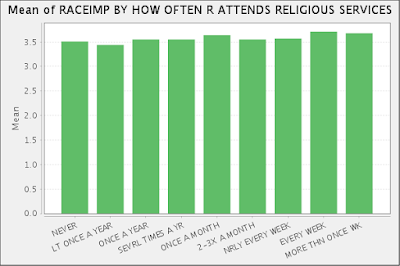Using General Social Survey day, I've shown before that non-white Americans are much more ethnocentric or clannish than whites.
Now this could be due to whites, especially those with ancestors from northwestern Europe, being more universalistic than other groups, or it could be due to the self-consciousness that comes from being in a very small group. You feel surrounded, so you stick together. This would mean that tiny whites groups would be clannish, too. Are Greek Americans, for example, somewhat clannish because they are a tiny slice of America, or because they are naturally ethnocentric?
I looked at this by creating a variable for ethnic group size. The group was scored 1, 2, or 3 depending on whether it was small, medium, or large. English, Italians, and Finns, respectively, serve as examples.
Next, I regressed how important your ethnic group is to you on to variables I thought might be related to clannishness. Here I show the standardized OLS coefficients (sample size = 1,959):
Importance of ethnic group to you
Age
.10***
Male
.00
Non-white
.32***
Immigrant
.06*
City size
.02
Education
-.03
Ethnic group size
.03
The variables that significantly predict clannishness from strongest to weakest are: non-white, being older, and being an immigrant. The other variables, including ethnic group size, don't matter.
(For age, perhaps people tend to "come home" as they get older, similar to what you see with religious involvement.)
So non-whites are not clannish because they're small and thus feel they need to stick together; rather, they are ethnocentric because that's who they are. Whites tend to be universalistic because that's who they are.
This has implications for assimilation. Evidently, non-whites will remain clannish even after being here for generations, as blacks and Native Americans have done. (I should mention that there is variation: according to GSS data, Japanese Americans are not ethnocentric, while Orthodox Jews are.)
If you want immigrants to become true blue Americans with no other loyalties, invite whites to move here.








